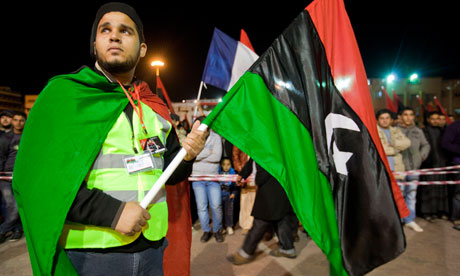
Libyan rebel protesters take to the streets of Benghazi. Photograph: Sean Smith for the Guardian
An African Union (AU) peace mission has received a frosty welcome in Benghazi, the de facto capital of the Libyan opposition, as rebel supporters insisted that Muammar Gaddafi relinquish power.
More than 1,000 demonstrators waved pre-Gaddafi flags and chanted slogans against the Libyan ruler outside a hotel in the city. They said they had little faith in the visiting mediators, who they said were mostly allies of Gaddafi who preached democracy for Libya but did not practise it at home.
The African negotiators, led by the South African president, Jacob Zuma, met Gaddafi in Tripoli on Sunday and afterwards said he accepted their "roadmap" for a ceasefire. However, an Algerian representative of the delegation was vague on whether the proposal included a demand for Gaddafi to give up power and would only say that the option was discussed.
The delegation, minus Zuma who left on Sunday night, arrived in Benghazi where protesters and the opposition leadership demanded that Gaddafi step down immediately."On the issue of Gaddafi and his sons, there is no negotiation," said Ahmed al-Adbor, a member of the opposition's transitional ruling council.
"The sons and the family of Gaddafi cannot participate in the political future of Libya," he added.
The meeting came hours after Nato air strikes hit Gaddafi's tanks, helping the rebels push back government troops who had been advancing towards Benghazi.
The AU's peace draft calls for an immediate ceasefire, co-operation in opening channels for humanitarian aid and the start of a dialogue between rebels and the government. AU officials, however, made no mention of any requirement for Gaddafi to pull his troops out of cities as the rebels have demanded.
Zuma called on Nato to end air strikes to "give the ceasefire a chance", but prospects for the AU plan looked bleak, given the chasm over Gaddafi's position.
"The issue of Gaddafi stepping down from any political position is a closed issue ... Muammar Gaddafi does not hold a position of power," Abdel Monem al-Lamoushi, a government spokesman, told al-Arabiya television. "No one has the right to send Muammar Gaddafi into exile out of the land of his forefathers. This man will not leave Libya."
The AU does not have a good record in brokering peace deals, having failed to end conflicts or disputes in Somalia, Madagascar and Ivory Coast.
Officials from Nato, which has been bombing Libyan government forces under a UN mandate to protect civilians, said they took note of the AU proposal but said the alliance would continue operations while civilians were at risk.
The AU delegation, consisting of the presidents of South Africa, Congo-Brazzaville, Mali and Mauritania, plus Uganda's foreign minister, landed at Tripoli's Mitiga airport after Nato gave permission for their aircraft to enter Libyan airspace. The planes were the first to land in Tripoli since the international coalition imposed a no-fly zone over the country more than two weeks ago.
Gaddafi later drove among the thousands of chanting supporters who gather daily at his compound to pledge their loyalty and act as a human shield against Nato air strikes. Gaddafi's public appearances have become less frequent as the crisis has progressed.
"It does not appear that this indication of a peace deal has any substance at this point," said one Nato official in reference to the shelling of Misrata, which has been under siege for six weeks. Al-Jazeera television quoted a rebel spokesman as saying five people had died and 20 were wounded in Misrata, the sole rebel-held city in western Libya. Rebels in Misrata told Reuters that Gaddafi's forces had fired Russian-made Grad rockets into the city, where conditions for civilians are said to be desperate.
The UN's children's agency said at least 20 children had been killed and many more injured in Misrata, Libya's third largest city, over the past three weeks.
Unicef said children as young as nine months were among the victims and most were under 10. It said they died of shrapnel from mortars and tanks, and bullet wounds. Unicef, which warned that tens of thousands more children were at risk because of lack of food and clean water, said last week that children in Misrata were being targeted by snipers.

No comments:
Post a Comment